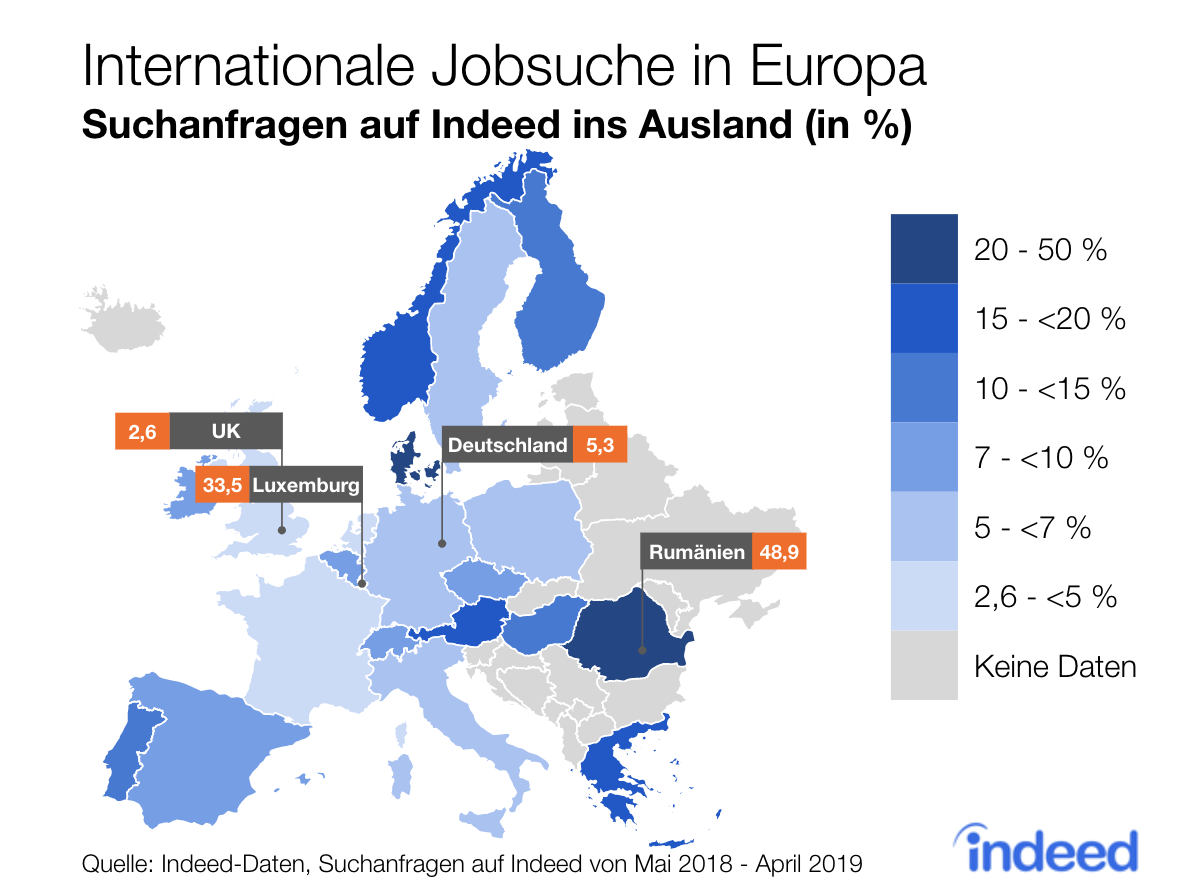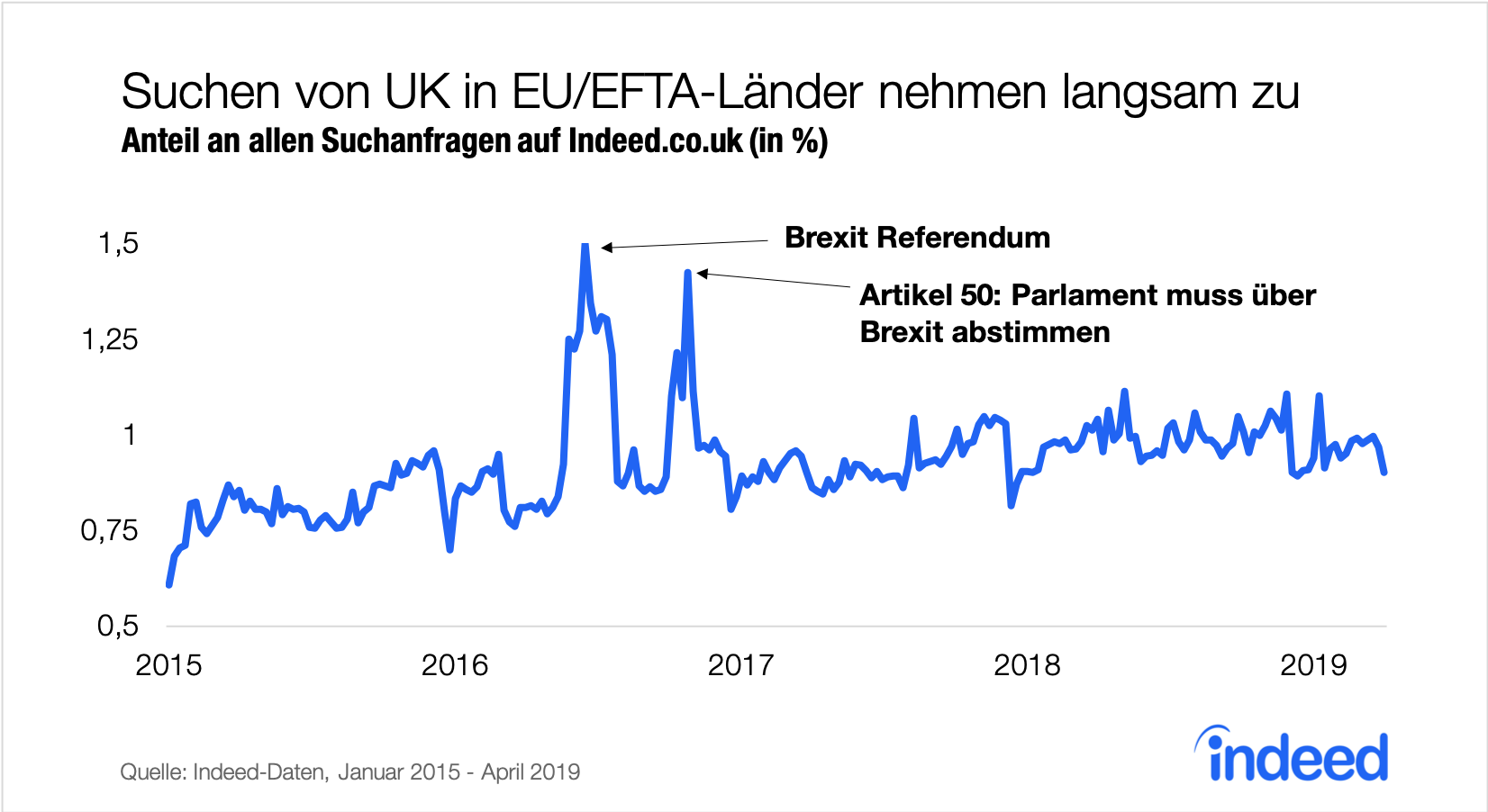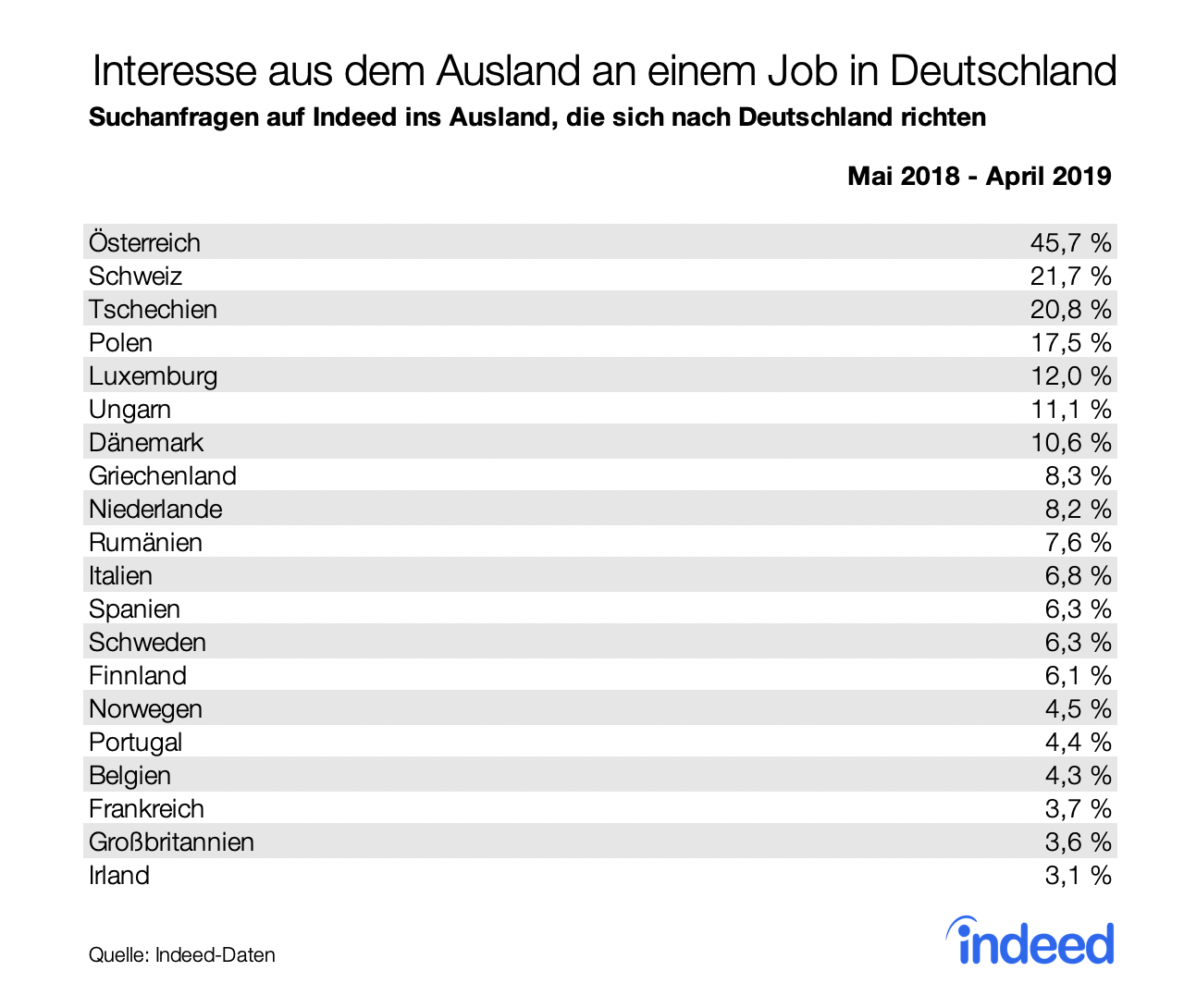The most important results in brief:
-
- The proportion of searches abroad differs greatly between European countries and varies between 48.9% in Romania and 2.6% in Great Britain. At 5.3%, job seekers in Germany rarely look for jobs abroad.
-
- Job searches from Great Britain to other European countries have skyrocketed around the Brexit referendum and the discussion about Article 50 in June and November 2016. The long-term increase (+ 17% from April 2015 to April 2019) cannot be clearly attributed to Brexit.
-
- Jobs in Germany are particularly sought after from countries that are geographically close to Germany and share a common language.
An important achievement of the EU is the free movement of workers. It enables an exchange of workers not only for border regions. In combination with the free movement of settlements, it enables EU citizens to freely choose their place of residence within the countries of the European Union and to work there. The European Commission’s “ Annual Report on Intra-EU Labor Mobility ” deals with mobility within the EU and the EFTA countries Switzerland, Norway and Iceland. The latest figures from 2017 show that 17 million EU citizens live and work in an EU member state other than their country of origin. In addition, there are another 1.4 million people who commute to work in another Member State every day.
We want to analyze the interconnection of the European labor markets from a new perspective, namely job search behavior. The most suitable data source for this is the job site Indeed, which is represented in over 60 countries. For the period from May 2018 to April 2019, we analyze job search behavior in the following European countries: Germany, Belgium, Czech Republic, Denmark, Ireland, Greece, Spain, France, Italy, Luxembourg, Hungary, the Netherlands, Austria, Poland, Portugal, Romania, Finland, Switzerland, Great Britain, Sweden and Norway. Overall, we fall back on many millions of search queries.
Based on our analyzes, we can supplement the official statistics of the individual countries and the European Union on the mobility of workers within the EU and the interconnection of the various European labor markets in two ways: first, by observing current trends without delay; Second, job search behavior can be assessed as a potential interest in a new job and is therefore part of a possible future development.
Finding a job abroad
Indeed has its own website in 21 European countries . We use this internationally comparable data to shed light on job search behavior abroad and to provide new insights into the mobility of workers within Europe.
In half of the countries examined, the proportion of job searches abroad is over 8.7% (median), in the other half of the countries it is below this value. The difference between the countries is very large, ranging from 48.9% in Romania to just 2.6% in Great Britain. A regional pattern of differences, for example from west to east or north to south, cannot be clearly identified. In Germany, 5.3% of all those interested in a job are looking for a job abroad. This makes Germany one of the European countries in which people are relatively rarely looking for a job abroad. The two countries Romania and Luxembourg have the highest proportion of job searches abroad and could not be more economically positioned: In Romania, almost every second job search is directed abroad (48.9%). After Bulgaria, Romania is the EU / EFTA country with the lowest gross domestic product per capita (GDP, Eurostat ). Over a third of the population lives below the poverty line . In Luxembourg, over a third of all searches go abroad (33.5%). After Liechtenstein, Luxembourg has the highest GDP per capita in Europe and the risk of poverty is below the European average. In Romania, the economic situation will be the main driver of a job search abroad, while Luxembourg job seekers are more likely to be drawn back to their (neighboring) home countries or to another country for the next career opportunity.

A map of Europe shows the percentage of international searches on Indeed abroad from May 2018 to April 2019. The countries with the most searches are Romania with 48.9% and Luxembourg with 33.5%. Other countries from which people seem to be looking for jobs abroad more often are Denmark, Austria, Norway, Greece and Portugal. From Germany, 5.3% are looking for jobs abroad and from Great Britain 2.6%.
The UK job market and Brexit
Let’s take a look at the special situation in Great Britain: The British labor market is still doing well despite the Brexit announcement. The unemployment rate is falling and the number of employees continues to rise. Only 2.6% of all job searches in the UK are directed abroad, making the UK the bottom of our ranking. Due to the great uncertainty surrounding Brexit, one could expect that the international specialists in Great Britain will look for jobs in other EU countries.
We analyzed the long-term development of job searches from Great Britain to other European countries from the beginning of 2015 to May 2019. At two points in time, searches from Great Britain to other European countries have skyrocketed: around the Brexit referendum in June 2016 and again in November 2016 with the discussion about Article 50, which allows Parliament to decide on Brexit. Viewed over the entire period, there is an increase in job searches from Great Britain to other European countries, but this is lower than one would expect. A comparison of April 2015 with April 2019 shows an increase of 17%. We cannot clearly attribute this development to Brexit. The generally good economic development in many European countries means that these countries are also looking for skilled workers and offer new options for job seekers. In addition, the number of returnees to their home countries has been loud European Commission report increased. Another Indeed analysis shows that searches from other EU countries for jobs in Great Britain have been increasing again for some time .

The graph shows the percentage of all searches on Indeed.co.uk for jobs in European countries and countries of the European Free Trade Association. The dates are from January 2015 to April 2019. At the time of the Brexit referendum, a high point can be seen. The curve drops steeply again and again reaches a high point at the time of Article 50, when Parliament has to vote on Brexit.
It remains exciting and important to see how search behavior in the UK will change as Brexit becomes more concrete and the effects on international workers become clearer. We will keep an eye on this and report on it. But already today we can take a look at which European countries were particularly attractive for job seekers from Great Britain from May 2018 to April 2019: 7.7% of all searches abroad by job seekers in Great Britain ended up in France, followed by Ireland (7.6%) , Spain (4.6%), Germany (3.6%) and Italy (3.1%).
As things stand at the moment, which German cities could particularly benefit from the British workforce? Among the job seekers from Great Britain who looked for a job in a certain German city from May 2018 to April 2019, Berlin is the most popular (21.7%), followed by Munich (8.6%) and Hamburg (6.9%) %). In the course of the Brexit discussions, there is speculation about the future of financial jobs in London. The campaign for jobs in the various financial centers of Europe has started. In this context, Frankfurt am Main is repeatedly mentioned as an attractive new location. Frankfurt am Main currently only ranks fourth (6.8%), ahead of Cologne (4.0%).
International specialists in Germany
Especially for countries like Germany – with an aging population, low birth rate, positive labor market development with low unemployment and the resulting shortages of skilled workers in some regions and professions – international skilled workers are a timely solution.
In February 2019, 12.1% of all employees subject to social security contributions in Germany were foreign nationals ( statistics from the Federal Employment Agency ). What is the interest in the German labor market and what potential is hidden here for the future? We use two key figures for an assessment: First, which countries make up the largest proportion of searches from abroad in Germany in absolute terms. Second, we calculate for each country how high the proportion of all searches abroad is that is directed to Germany. We use this to look at the level of interest in a job in Germany – depending on how likely it is to look for a job abroad in this country.
We have evaluated all search queries from job seekers worldwide and calculated which countries account for the highest proportion of searches from abroad in Germany. The top 5 countries all come from the EU. Four of Germany’s neighboring countries are even among the top 5 countries from which Germany is looking for a job: Austria (9.5%), Switzerland (6.6%), France (6.3%) and Poland (5.6%) ). In second place is the UK with 8.2% of all searches. Particularly noteworthy are Austria and Switzerland, as these are less populous countries and still take first and third place. This clearly shows how closely the common language brings the labor markets together. There is also a similar training system. That different languages and training qualifications are factors Institute for Employment Research (IAB) for the Franco-German border region.
At this point, let’s take a look at the second key figure, the proportion of searches abroad directed towards Germany. Almost every second search that job seekers in Austria send abroad ends up in Germany (45.7%). In Switzerland, too, every fifth job search abroad ends up in Germany (21.7%). This clearly shows that job seekers in Austria and Switzerland are very interested in the German labor market. Is it the other way around? 15.1% of all searches abroad from Germany go to Switzerland, but only 3.7% to Austria.
Austria and Switzerland are not the only countries where job seekers find the German job market attractive. The German labor market is also very popular with Czech (20.8%) and Polish (17.5%) job seekers looking for a job abroad. Job seekers from Great Britain (3.6%) and Ireland (3.1%) are the least likely to look for a job in Germany. The UK has a large workforce so there are many searches abroad. In absolute terms, Great Britain ranks second in Germany. Nonetheless, the proportion of searches abroad directed to Germany is low and is only the 3.6% described above.

The table shows the search queries on Indeed abroad that are directed to Germany. The data from May 2018 to April 2019 for 20 countries are shown. The list is headed by Austria with 45.7%, Switzerland with 21.7% and the Czech Republic with 20.8%. This is followed by Poloen with 17.5%, Luxembourg with 12%, Hungary with 11.1% and Denmark with 10.6%. Other countries are Greece with 8.3%, the Netherlands with 8.2%, Romania with 7.6%, Italy with 6.8%, Spain and Sweden with 6.3% and Finland with 6.1%. Fewer searches come from Norway (4.5%), Portugal (4.4%), Belgium (4.3%) as well as from France with 3.7%, Great Britain with 3.6% and Ireland with 3.1%.
The analysis of international job search behavior in Europe has clearly shown that job seekers think outside the box. The German labor market benefits above all from its direct neighbors.
Despite language barriers and other hurdles, the labor market brings people from different nations and cultures together. Despite all the criticism and all the difficulties that arise in the course of the European integration process due to the differences between the countries – the free movement of settlements and workers is an opportunity for Europe. International skilled workers represent a very important labor resource for most of the European countries. In the future, with a view to demographic change, they may become even more important in countries like Germany.
Methodological notes
Our analyzes focus on 21 EU / EFTA countries in which Indeed has its own website: Germany, Belgium, Czech Republic, Denmark, Ireland, Greece, Spain, France, Italy, Luxembourg, Hungary, the Netherlands, Austria, Poland, Portugal, Romania, Finland, Switzerland, Great Britain, Sweden and Norway.
Analyzes that calculate the proportion of searches abroad directed to Germany are only shown for these 21 countries. However, all global target countries were taken into account when calculating the share values.
In order to correctly illustrate the importance of the individual European labor markets, we consider all searches abroad as a basis, regardless of whether they go to EU / EFTA countries or to third countries. This means, for example, that of all searches on Indeed in Great Britain abroad, 3.6% go to Germany. Concentrating only on European countries at this point as the denominator of the calculations could lead to an overestimation of the importance of European countries and is thus avoided.






